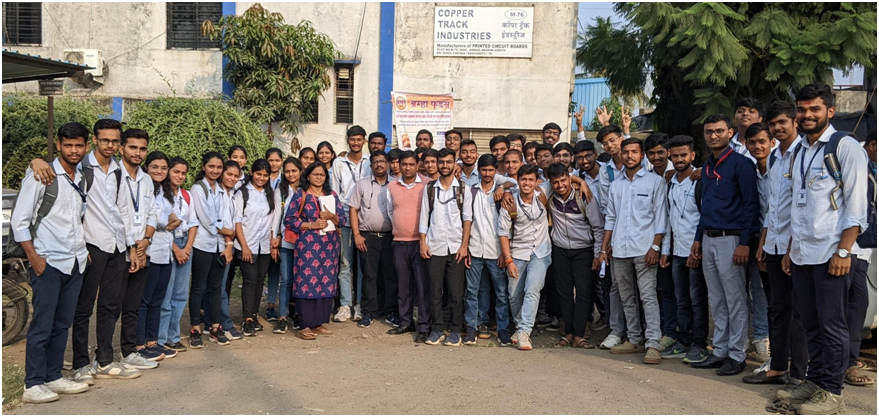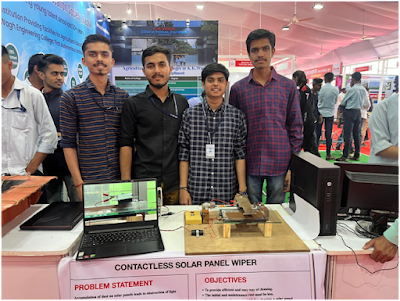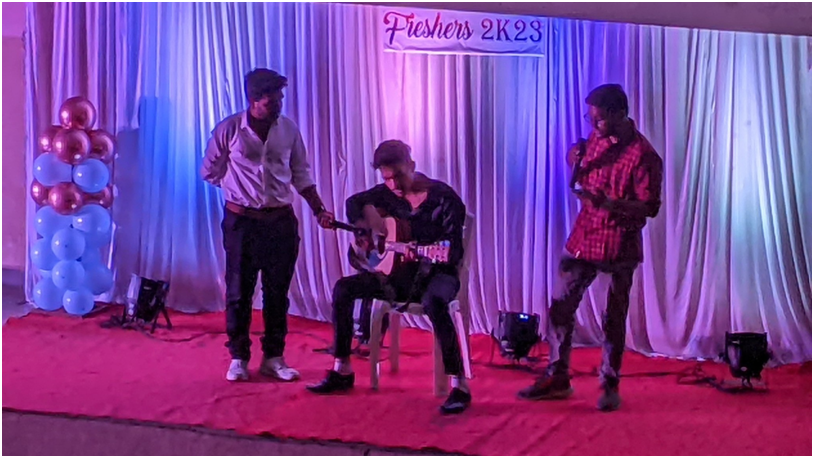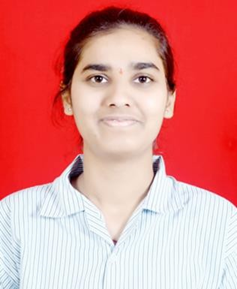Department Events
Expert lecture on “Overview of The Semiconductor Industry and Career Options” on 25/11/2023
Department of Electrical
Engineering in Association with IET On-Campus Organized an Expert Lecture on “Overview
of The Semiconductor Industry and Career
Options” for SE (A and B) students and staff of the department on 25/11/2023: Resource Person: Mr. Chetan
Patil,
Senior Product Engineer, NXP USA Inc. Total No. of Students present = 112. The session helped students to understand what opportunities they can
grab in semiconductor industries and, the different roles of engineers in industry.
Even the manufacturing process of semiconductors was discussed by the expert.
Short-term training program (STTP) on “ANSYS for Machine Design”
Department of Electrical Engineering and Electric Mobility
and Transportation (EMT) Club completed Two days of the short-term training
program (STTP) on “ANSYS for Machine
Design” in association with ARK Info
Solutions from 30th October 2023 to 31st October 2023. The topics discussed
during the STTP are Introduction to ANSYS LF Tools and Maxwell GUI. The STTP
was attended by students as well as faculty members. The STTP was coordinated
by Prof. Ganesh Jadhav and Prof. Snehal Sagare.
Warli painting activity for the F. Y. B. Tech students on 06/11/2023
The
department recently organized a “Warli
Painting Activity” for the F. Y. B. Tech students. It was a great
opportunity for them to learn more about this traditional art form and to
express their creativity. The activity was well-received by the students, who
enjoyed the chance to work with different materials and techniques. Overall, it
was a fun and educational experience for everyone involved.
E-Learning on “Electric Vehicle Design” on 04/11/2023
Department
of Electrical Engineering in association with Pantech E-Learning has completed
an exclusive 3-Hours Live Zoom Session on “Electric
Vehicle Design” on 4th November 2023. A live interactive workshop was
conducted by Mr Malaiyappan,
Technical Director and industry Project Acquisition Manager in the EV sector.
The topics discussed during the webinar were Introduction to MATLAB, Forces on
EV design calculation, and Simscape-based modelling. The webinar was attended
by students as well as faculty members. The webinar was coordinated by Prof. Snehal Sagare.
Student Corner
Student Placement
The following
students are placed in various multinational companies. Congratulations to all
the students!
Placed Students Details (November - 2023)
|
Sr. No. |
Name of the Student |
Placement Date |
| 1. |
Amrita Devi |
08/11/2023 |
| 2. |
Mahadwad Devanand
Ramrao |
09/11/2023 |
|
3. |
Yeola Hitesh
Jagannath |
09/11/2023 |
|
4. |
Naik Pradeep Sampat |
09/11/2023 |
|
5. |
Wagh Pranali Vilas |
09/11/2023 |
|
6. |
Changan Prasad
Dasharath |
09/11/2023 |
|
7. |
Tidake Prasad Vilas |
09/11/2023 |
|
8. |
Bodke Roshan Ramesh |
09/11/2023 |
|
9. |
Varode Swarup Mohan |
09/11/2023 |
|
10. |
Kale Nikita
Nandkishor |
09/11/2023 |
|
11. |
More Neha Sandip |
16/11/2023 |
|
12. |
Dheple Ishwari Sanjay
|
16/11/2023 |
|
13. |
Aishwarya Mohan
Gadekar |
18/11/2023 |
|
14. |
Gayatri Gorakh Jadhav |
18/11/2023 |
|
15. |
Gayatri Kishor Desale |
18/11/2023 |
|
16. |
Sakshi Sham Girase |
18/11/2023 |
|
17. |
Sandhya Bharat Shinde |
18/11/2023 |
|
18. |
Shital Kailas Waje |
18/11/2023 |
Industrial visit and PCB Manufacturing Workshop at Copper Track Industry on 06/11/2023
The Department of Electrical Engineering has conducted an industrial
visit and PCB Manufacturing Workshop at Copper Track Industry for
S.Y. B.Tech. It was an amazing experience for the students. Students got to
witness the production process of copper wires and cable harnesses first-hand,
and it was truly fascinating. The staff members at Copper Track Industry were
very welcoming and knowledgeable. They explained everything in detail and
answered all our questions patiently. Students got to see the various machines
used in the production process and learn about the different stages involved in
making PCBs. It was a great opportunity for students to see how the theoretical
knowledge gained in classrooms is applied in real-life scenarios. The visit and
workshop were coordinated by Prof. Nayana Jangle, Prof. Alok Kumar
and Prof. Nikhil Gaikwad.
Industrial Visit on 06/11/2023
On 6th November 2023, an
industrial visit was successfully done at “Altra Power Electrical Industry,
Sinnar” for S.Y. B.Tech (Div B) students. A total of 59 students and two
faculties Prof. Ganesh Jadhav and Mrs. Jayshree Ghumare were
present for the industrial visit. This visit has been conducted for the course
on Transformer and Induction Machines.
This has helped students to better understand the course and bridge the
gap between theoretical knowledge and real-time industrial work. Some students
have assembled the shaft and winding on the rotor.
Industrial Visit on 07/11/2023
Industrial visit at Altra Power Electrical Industries, Malegaon, Sinner for SYB.Tech - Div A students on 7th November 2023. The visit was coordinated by Prof. Sudhir Shinde and Ms. Ranjana Gaikwad.
Industrial visit on 28/11/2023
The department has arranged an
Industrial visit of S.Y. B.Tech Students (Div A and B) to Gauss
Electromagnetics, Nashik on 28th November 2023. The visit was coordinated
by Prof. Chetan Gadge and Prof. Pooja Sapkade. During the visit,
students got the opportunity to interact with industry professionals and learn
about the latest trends and technologies used in the industry. They also got an
insight into the work culture and work environment of the industry. Industrial
visits helped students develop a better understanding of the workplace, and
they got to see how theoretical knowledge is applied in practical situations.
Aavishkar 2023 Competition
The team from the Department of
Electrical Engineering has been selected for the University Level Round of the Aavishkar
2023 Competition. The team is guided by Prof. Ganesh N. Jadhav. Team
members are Atharva Rajhans, Avishkar Arote, Mayur Bunge and Siddhant
Sakhare. Congratulations and Best wishes to them.
NPTEL Courses
The
following students successfully completed the NPTEL course: Congratulations to
all the students!
|
Name of Students
|
Course Name |
Final Score % |
|
Ahire Yash Manojkumar |
DC Microgrid and Control System |
51 |
|
Ahirrao Nitin Pramod |
DC Microgrid and Control System |
44 |
|
Bagul Sandip Pandit |
DC Microgrid and Control System |
45 |
|
Barkade Tushar Sida |
Soft Skill Development |
58 |
|
Bhargav Pratik Gajanan |
Power Plant Engineering |
54 |
|
Bhavsar Harshad Sham |
DC Microgrid and Control System |
47 |
|
Bodke Roshan Ramesh |
DC Microgrid and Control System |
68 |
|
Bodke Yash Dnyaneshwar |
Power Plant Engineering |
42 |
|
Changan Prasad Dasharath |
Power Plant Engineering |
58 |
|
Chaudhari Mehul Ravindra |
DC Microgrid and Control System |
46 |
|
Chavanke Gauri Ravindra |
Power System Protection and Switchgear |
69 |
|
Cheke Yash Pundlik |
DC Microgrid and Control System |
52 |
|
Choukate Aditya Prakash |
Power System Protection and Switchgear |
75 |
|
Dalavi Samarth Shyamsundar |
Power Plant Engineering |
41 |
|
Dhage Amit Ramnath |
Developing Soft Skills and Personality |
66 |
|
Dhake Chandan Mahendra |
Power System Protection and Switchgear |
75 |
|
Dhomase Anuja Dilip |
Power System Protection and Switchgear |
49 |
|
Firake Jayesh Ramesh |
Power System Protection and Switchgear |
80 |
|
Gawande Uday Popat |
Soft Skill Development |
51 |
|
Girase Sakshi Sham |
Power System Protection and Switchgear |
80 |
|
Jadhav Gayatri Gorakh |
Power System Protection and Switchgear |
65 |
|
Jadhav Prashant Deepak |
Power System Protection and Switchgear |
62 |
|
Kale Aditya Dilip |
Fundamentals of Electrical Engineering |
54 |
|
Kale Shraddha Somnath |
Power System Protection and Switchgear |
61 |
|
Kalyankar Umesh Namdevrao |
DC Microgrid and Control System |
81 |
|
Kamble Tejas Tukaram |
Power System Protection and Switchgear |
55 |
|
Kardak Vishal Devidas |
Power Plant Engineering |
49 |
|
Katkade Pratik Sanjay |
Soft Skill Development |
46 |
|
Kedare Darshan Prabhakar |
Power System Protection and Switchgear |
63 |
|
Kharane Kajal Babanrao |
Power System Protection and Switchgear |
66 |
|
Khatal Ashish Chudaman |
DC Microgrid and Control System |
60 |
|
Kothawade Apurva Anil |
Power System Protection and Switchgear |
73 |
|
Kulkarni Gaurav Ganesh |
Sustainable Power Generation Systems |
49 |
|
Kulkarni Hrushikesh Ajay |
Power Plant Engineering |
41 |
|
Kushare Rajashree Vilas |
Power System Protection and Switchgear |
60 |
|
Mahadwad Devanand Ramrao |
Power System Protection and Switchgear |
66 |
|
Mahale Vaishnavi Sanjay |
DC Microgrid and Control System |
39 |
|
Mandlik Prasad Madan |
Power Plant Engineering |
50 |
|
Mistary Gaurav Rajesh |
Fundamental of Electrical Engg |
43 |
|
Mudgul Shivam Valu |
Power System Protection and Switchgear |
66 |
|
Naik Pradeep Sampat |
Power Plant Engineering |
52 |
|
Ohol Gayatri Sanjay |
Power System Protection and Switchgear |
62 |
|
Palde Tejas Vilas |
Power System Protection and Switchgear |
73 |
|
Pangarkar Parth Dhananjay |
Design of Electric Motors |
43 |
|
Pansare Rushikesh Balaji |
Power System Protection and Switchgear |
46 |
|
Patil Kalpesh Yuvraj |
Sustainable Power Generation system |
65 |
|
Patil Rohit Krishna |
DC Microgrid and Control System |
56 |
|
Rajbhoj Dnyaneshwari Nandkishor |
Ecology and Environment |
44 |
|
Shaikh Shahrukh Khayyum |
Power System Protection and Switchgear |
54 |
|
Sharma Aman Shravan |
Power Plant Engineering |
50 |
|
Shermale Roshan Ramkisan |
Power Plant Engineering |
45 |
|
Shinde Neha Vijay |
Power System Protection and Switchgear |
47 |
|
Shinde Sandhya Bharat |
Power System Protection and Switchgear |
70 |
|
Suryavanshi Siddhesh Dilip |
Power System Protection and Switchgear |
68 |
|
Tidake Prasad Vilas |
Power Plant Engineering |
50 |
|
Varode Swarup Mohan |
Power Plant Engineering |
48 |
|
Wagh Pranali Vilas |
Power System Protection and Switchgear |
65 |
|
Wagh Sahil Santosh |
Developing soft Skills and Personality |
54 |
|
Wagh Tejas Kautik |
DC Microgrid and Control System |
50 |
|
Wankhade Amar Mohan |
Power System Protection and Switchgear |
78 |
|
Yeola Hitesh Jagannath |
Power System Protection and Switchgear |
65 |
|
Chinchole Prathmesh Rajesh |
DC Microgrid and Control System |
52 |
Krishithon 2023 (Agriculture Expo & Agri Exhibition)
A project by our students was presented at Krishithon 2023 (Agriculture Expo & Agri Exhibition) in Nashik. Students are Atharva Rajhans, Avishkar Arote, Mayur Bunge and Siddhant Sakhare.
Fresher Welcome Party 2023
After
a gap of 4 years, the Department and EFFECT Student Body organized a welcome
party (Freshers Party) for the S. Y.
B. Tech students. It was the 1st welcome of students entered under
Autonomy. It was great to see the excellent coordination among students, and
enthusiasm to showcase talent and create a sense of belonging. Everyone has a
great time and gets to know each other better.
Faculty Participation
The following staff members have completed the courses given below in
November 2023
|
Name of staff |
Name of course |
Duration |
Platform |
|
Prof. Sudhir
Shinde |
NPTEL- AICTE
Faculty Development Program “Ethics in
Engineering Practices” |
8 weeks |
Online FDP course |
|
Prof. Aishwarya R. Awhad |
International Faculty Development Program
(FDP) on “Advanced Topics in Control Systems” |
3 Day |
Offline FDP course |
Congratulations!
The patent is granted for Dr. Ravindra Munje and Prof.
Sudhir Shinde. Other faculty members are Dr. Ajinkya Joshi, Dr. Vilas
Patil and Prof. Prakash Kadve.
Congratulations to Prof Prajakta Vikas Dhole
Congratulations to Prof. Sudhir K Shinde
Congratulations to Prof. Swapnil S Sudake
Alumni Interaction and Felicitation
Mr. Dhaval Tagare,
an Alumnus of the Department and the owner of E-mmortal
Automotives Pvt. Ltd. (Battery Manufacturing Company) visited the stall K. K. Wagh Education Society at Krishithon Exhibition 2023 on 25th
November 2023. During this visit, Prof.
Jitendra Patil felicitated Mr. Dhaval
T. and his team and provided the latest updates about the department and
institute.
News Paper
Congratulations!
An
initiative by our student Mr. Prasad
Rathod. He presented his research paper at the 74th International
Astronautical Congress in Baku, Azerbaijan on 6G communication for satellite
and terrestrial connectivity. Congratulations to him.
Student Articles:
DC Microgrid for Rural and Remote Electricity Access Application
Komal Dilip Kalamkar TE-B (Electrical)
Access to reliable electricity is
essential for the socio-economic development of rural and remote areas.
However, conventional AC grid
extensions often prove impractical due to high costs, long transmission lines,
and environmental constraints. This
project report explores the design, implementation, and assessment of a DC microgrid system
tailored for rural
and remote regions, with a
particular focus on enhancing electricity access and fostering economic development.
1. Introduction
Access to reliable electricity is a
fundamental requirement for the social and economic development of rural and
remote areas. However, many of these regions face challenges in establishing and maintaining conventional AC grid infrastructure. This project report explores the design, implementation, and
evaluation of a DC microgrid system for rural and remote electricity access applications.
Through a case study, we demonstrate the feasibility of this technology and its
potential to transform the lives of underserved communities.
In the quest for universal energy access, the focus has shifted towards
innovative solutions tailored for rural and remote areas. One such promising
technology gaining traction is the implementation of DC microgrids shown in Fig.
1. Unlike traditional AC systems, DC microgrids offer a more efficient and
cost-effective approach to electrifying off-grid communities
2. Architecture of
DC Microgrid
Key
Components of DC Microgrid Architecture:
(1) Generation
Sources:
Solar Power:
Photovoltaic panels harness the abundant sunlight in remote areas, converting
it into direct current. Solar power forms a cornerstone of sustainable energy
generation in DC microgrids.
Wind
Turbines: Small-scale wind turbines contribute to the energy mix, particularly
in regions with favorable wind conditions. Their modular design makes them
suitable for decentralized energy production.
(2) Energy
Storage:
Batteries:
DC microgrids rely on energy storage solutions such as lithium-ion batteries to
store excess energy generated during peak times. These batteries ensure a
steady power supply during periods of low or no generation.
(3) DC Bus:
Distribution
Network: A low-voltage DC bus forms the backbone of the microgrid, efficiently
distributing power to various loads within the community. The simplicity of DC
distribution reduces transmission losses and enhances overall system
reliability.
(4) Power
Electronics:
Inverters
and Converters: While the microgrid operates on DC, certain appliances may
require AC power. Inverters and converters play a crucial role in converting
power between DC and AC as needed, ensuring compatibility with a variety of
devices.
(5) Control
and Monitoring System:
SCADA
Systems: Supervisory Control and Data Acquisition (SCADA) systems enable
real-time monitoring and control of the microgrid. This technology allows for
remote management, fault detection, and optimization of energy flows.
3. How it works?
A DC microgrid operates on direct current, providing
localized power distribution with various benefits. Key components include
power sources (solar panels, batteries), converters, and loads. DC minimizes
energy losses, enhances efficiency, and supports the integration of renewable
sources. It's gaining traction for its resilience and suitability in specific
applications, contributing to sustainable energy solutions.
Fig 1. DC Microgrid
4. Challenges in DC Microgrid
DC microgrids hold great potential for providing electricity access in
rural and remote areas, but they also come with a set of challenges. One
significant challenge is the limited availability of DC-compatible appliances
and devices, which can make it difficult for residents to fully utilize the
power supply. Moreover, DC microgrids often require careful design and
maintenance due to voltage and current management issues. These grids may face
efficiency losses over longer transmission distances, and voltage drop can become
a concern. Additionally, sourcing, installing, and maintaining the necessary
renewable energy generation equipment, such as solar panels and wind turbines,
can be logistically challenging in remote locations. Furthermore, financing and
community engagement are essential for the successful implementation of DC
microgrids in rural and remote areas. Overcoming these challenges will be
crucial for ensuring reliable and sustainable electricity access in these
underserved regions.
5. Future Scope
(1) Saving Energy: DC microgrids can help us use electricity more
efficiently, which means we waste less energy and save money.
(2) Clean Energy: They're great for using clean energy from sources like
the sun and wind, helping us be more
eco-friendly.
(3) Keeping the Lights On DC microgrids can keep the power on even when the main electricity grid has problems, making
our electricity supply more reliable.
(4) Smart Energy: They can work together with smart technologies to make our electricity grid smarter and better at managing
power.
(5) In Cities and Countryside: DC microgrids can be used in both big cities
and remote areas to provide electricity where it's
needed.
(6) Charging Electric Cars: They can make it faster and easier to charge electric
cars, which is good for the environment.
(7) Safety and Security: We need to make sure they are safe from hackers
and other problems to keep our electricity supply secure.
(8) Affordable Energy: We're working to make sure DC microgrids are not too
expensive, so more people can use them.
(9) Ongoing Improvements: Scientists and engineers are always finding new ways
to make DC microgrids better and more useful.
6. Conclusion
The implementation of a DC microgrid for rural and remote electricity access applications holds significant promise for addressing energy challenges in these areas. DC microgrids offer a reliable and cost-effective solution that can efficiently harness renewable energy sources, such as solar and wind, to provide consistent power supply to off-grid and underserved communities. This technology has the potential to improve the quality of life, stimulate economic development, and reduce carbon emissions in these regions. However, successful deployment will depend on careful planning, community engagement, and ongoing maintenance to ensure the sustained benefits of electricity access to rural and remote areas.







































No comments:
Post a Comment